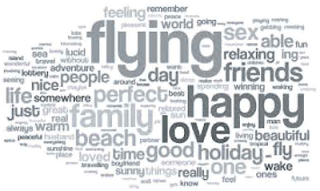1. Warm up activity:
□ Read the following words. You may not be familiar with some of them. Look up their meaning in a dictionary. How are they related to dreams?
colour nightmare imagination day-dream
reverie romantic hallucination shadowy
silvery short lasting dreamy dreamer
reality pleasant haunting fragments
□ Work in pairs and discuss the following questions:
a. What is a dream?
b. Do you have any dreams?
c. Is a dream real or unreal?
d. Is there any relation between dream and action?
e. Who is a dreamer? Do you like a dreamer? Why/why not?
2. Read the following text and fill in the gaps with words (you will use only the relevant ones) listed above:
All of us know what a dream is. Generally we dream during our sleep. Dreams may appear to be short or long lasting. Sometimes we say, I dreamt for the whole night! But do we really dream for the whole night? Some dreams are sweet or (a)……………… Some are horrible. When we dream something extremely bad, we call it a (b) ……………… This is interesting that dreams have no (c) ……………… They are soft, (d) ……………… and (e) ……………… Do you know how the words (f) ……………… and (g) ……………… differ from dream? Do you know any (h) ……………… ? What do they do? Does dream have any relation with (i) ……………… ? Do we always dream during our sleep? The dream we have during the day time is called (j) ……………… Sometimes we long for something so passionately. We call that a dream as well.
3. Now read the article below and see what you think about dreams - similar or dissimilar to what is said here:
Dreams have fascinated philosophers for thousands of years, but only recently have dreams been subjected to empirical research and scientific study. Chances are that you've often found yourself puzzling over the content of a dream, or perhaps you've wondered why you dream at all.
First, let's start by answering a basic question: What is a dream? A dream can include any of the images, thoughts and emotions that are experienced during sleep. Dreams can be extraordinarily vivid or very vague; filled with joyful emotions or frightening images; focused and understandable or unclear and confusing.
Why do we dream? What purpose do dreams serve? While many theories have been proposed, no consensus has emerged. Considering the time we spend in a dreaming state, the fact that researchers do not yet understand the purpose of dreams may seem baffling. However, it is important to consider that science is still unraveling the exact purpose and function of sleep itself. Some researchers suggest that dreams serve no real purpose, while others believe that dreaming is essential to mental, emotional and physical well-being.
Next, let's learn more about tome of the moat prominent dream theories.
Consignment with the psychoanalytic positive, Sigmund Frat fa theory of drams suggests that dreamt are a representation of unconscious desires, thought! and motivations. According to Freud, people are driven by aggressive and sexual instincts that are. While few flyweight expressed, they find their way Into our awareness via dreams. In hit famous book The Interpretation of Dreams Freud wrote that dream are —disguised fulfillment of repressed.
Freud's theory contributed to the popularity of dream interpretation. Following his paths many theorists came up with their own ideas about dreams. The following are just a few of them:
□ Some research suggest that drams are a subjective interpretation of signals outwitted by the brain during sleep, Drama are not daring dream? the cognitive elements in our brain produce new Ideas.
□ One theory suggests that drams are the result of oar brains trying to Interpret external stimuli during sleep. For example, the sound of the radio may be incorporated into die content of a dream.
□ Another theory uses a computer metaphor to account for dreams. According to this theory, dreams servo to 'clean up' clutter from refreshing the mind to prepare for the next day.
□ Yet another model proposes that dreams function as a form of psychotherapy. In this theory, the dreamer is able to make connections between different thoughts and emotions in a safe environment.
4. Find out the meaning of the following words and identify their parts of speech, and then make sentences with them:
a. empirical
b. vivid
c. vague
d. frightening
e. baffling
f. unravel
g. psychoanalytic
h. perspective
i. motivation
j. awareness
k. repressed
1. cognitive
m. stimuli
n. incorporate
o. clutter
p. psychotherapy
5. Theorists interpret dreams during our sleep. But we dream when we are awake too. Now give examples of some of your dreams:
□ A sweet dream while sleeping
□ A nightmare
□ A dream that you always cherish consciously
□ A day dream
6. Now write about some dreams that you want to make real. For example:
I have always dreamt that I will he an engineer. I study science and I am good in maths, so that should not be an impossible task.
7. Now write a paragraph of 100 words narrating what you will do if you become a democratically elected student leader in your college.
8. Now write about some dreams that you couldn't make real along with the conditions that could make your dreams true. For example:
I could be a good cricketer if I practised a lot.
9. Now write a paragraph of 100 words narrating what you would do if you won a million Taka lottery.
10. Summarise the text on dreams highlighting the following points:
□ What is a dream?
□ Why do we dream?
□ Does a dream have any meaning?
□ What are the benefits of dreaming?







C solve
ReplyDeletesummary ans? 10 no ans?
Delete